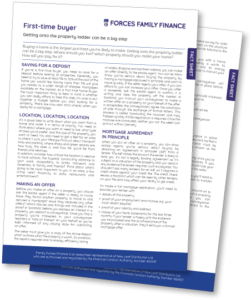

First-time buyer
Getting onto the property ladder can be a big step
First-time buyer
Getting onto the property ladder can be a big step
Saving for a deposit
If you’re a first-time buyer, you need to save for a deposit before looking at properties. Generally, you need to try to save at least 5% to 20% of the cost of the home you would like. Saving more than 5% will give you access to a wider range of cheaper mortgages available on the market. As a first-time home buyer, the most important thing to bear in mind is whether you can really afford to take this step. It’s wise to put together a budget before you start looking for a property. There are now also strict checks when you apply for a mortgage.
Location, Location, Location
It’s a good idea to write down what you want from a home and order it in terms of priority. You need to think about where you want or need to live, what type of area you’d prefer, and the size of the property you want or need. You also need to get a feel for an area to check it suits your lifestyle. Find out about transport links and parking, where shops and green spaces are, how busy the area is, and how far you’d be from friends and relatives.
In addition, consider how critical the location is relative to local schools, the hospital, commuting distance to your work, accessibility to public transport, and closeness to family and friends? Think about what’s going to be most important to you in an area: a low crime rate? Proximity to pubs, restaurants and entertainment?
Making an offer
Before you make an offer on a property, you should ask the estate agent if the seller is ready to move. Have they found another property to move to and secured a mortgage? Have they received any other offers? Which fixtures and fittings are included in the price? In Scotland, before you express an interest in a property, you appoint a conveyancer. Once you find a property you’re interested in, your conveyancer registers a ‘note of interest’ on your behalf so you’re kept informed of any closing date for submitting an offer.
The seller must give you a copy of the Home Report which outlines what the property is worth, its condition, the repairs required and its energy-efficiency rating.
In Wales, England and Northern Ireland, you can make an offer directly to the estate agent. You can let them know you’re serious about buying the property by having a mortgage approved in principle, and want to move quickly. If the seller rejects your offer, if you can afford to, you can increase your offer. Once you offer is accepted, ask the estate agent to confirm it in writing and take the property off the market In Scotland, you instruct your conveyancer to make a written offer on a property on your behalf. If the offer is acceptable, the conveyancers agree the conditions of sale through the exchange of formal letters. This process is called ‘concluding the missives’ and may happen quickly if little negotiation is required. Once the missives are concluded, neither you nor the seller can pull out without penalty.
Mortgage agreement in principle
When you put an offer on a property, you can show estate agents you’re serious about buying by
obtaining an ‘agreement in principle’ (AIP) from a lender. The AIP states the amount the lender is likely to lend you. It’s not a legally binding agreement as it’s subject to a valuation of the property and you send in any evidence the lender requires, such as payslips. You shouldn’t ask many lenders for an AIP, as it requires a credit check against your credit file. The credit check leaves a footprint which can be seen by other lenders on your file and may affect your ability to get credit.
To make a full mortgage application, you’ll need to provide your lender with:
- details of the property
- proof of your employment and income, e.g. your most recent payslips
- proof of your identity and address
- copies of your bank statements for the last three months if your lender is happy with the evidence you’ve provided and the purchase price of the property after a valuation, they’ll send you a formal mortgage offer.
Arranging your mortgage
When considering the different mortgage deals available, we’ll discuss the following with you:
- Type of loan – repayment (where you pay part of the balance and interest each month), interest-only or both
- Type of mortgage – for example, fixed-rate, tracker or schemes designed to help first time buyers
- Mortgage rate – it’s important to look beyond the initial interest rate and consider what the rate will be after the deal ends
- Mortgage fees – these can be considerable, particularly if you change your mortgage before your deal ends, so make sure you check what fees apply to the mortgage you’re considering
Mortgage ‘Stress Test’
Mortgage lenders will check that you can afford the mortgage and also ‘stress test’ your ability to make your payments if interest rates were to rise or if your circumstances changed, such as a planned retirement date or if you started a family. As part of the mortgage application process, you’ll need to show the lender evidence of any outgoings you have and prove your income.
Legal matters
A conveyancer deals with the legal side of a buying a property. They arrange the transfer of ownership by drawing up and exchanging contracts with the seller’s conveyancer (or ‘concluding missives’ in Scotland). They also arrange the payment of Stamp Duty Land Tax or Land or Buildings Transaction Tax in Scotland, and conduct legal searches, including local authority, water drainage and environmental searches and register the property title in your name. In Wales, England and Northern Ireland, you appoint a conveyancer once your offer is accepted on a property. In Scotland, you appoint a conveyancer before you make an offer on a property, as they are responsible for placing the offer on your behalf. A survey should point out any major issues with the condition of the property. If it brings up issues you’re not aware of, you could ask the seller to reduce the sale price or fix the issues before exchange of contracts. If they’re not willing to do this, you may need to reconsider your options.
The different surveys available are:
- a snagging report – a survey for new builds giving an overview of defects and poor finishing
- a home buyer report – a more detailed survey giving guidance on defects and repairs that need sorting out
- a building report – a comprehensive survey for older properties giving a full breakdown on the structure and condition of a property. It can be tailored to the property
In Scotland, the seller provides you with a Home Report outlining what the property is worth, its condition, the repairs required and its energy efficiency rating. You can also choose to instruct your own survey as well.
Exchanging contracts – your conveyancer will arrange for all the paperwork to be in place before completion date.
They will exchange contracts (or conclude missives) with the seller’s conveyancer, once you’ve:
- received your final mortgage offer
- checked through and are happy with all the legal documents
- transferred your deposit to your conveyancer
- agreed a completion date
- signed the contract
You’ll need to have buildings insurance in place before you exchange in England, Wales and Northern Ireland. In Scotland, buildings insurance must be in place before the completion date known as the ‘Date of Entry’.
You’re legally bound to buy the property once you’ve exchanged contracts or concluded missives. If you decide to pull out after this point, you could lose your deposit and may face legal action from the seller.
After exchanging or concluding missives, you’ll need to sign the mortgage deed and a document to transfer ownership of the property to you.
Completing – usually, completion takes around six to eight weeks but it may be longer if you’re in a property chain. On the day of completion, you can move into your new home once your conveyancer confirms the money has been transferred to the seller’s conveyancer.
Call us now on 0330 332 2614
to speak to a member of our experienced and qualified financial advisers
Call us now on 0330 332 2614
to speak to a member of our experienced and qualified financial advisers
Download our FREE guide for First-time buyers!




